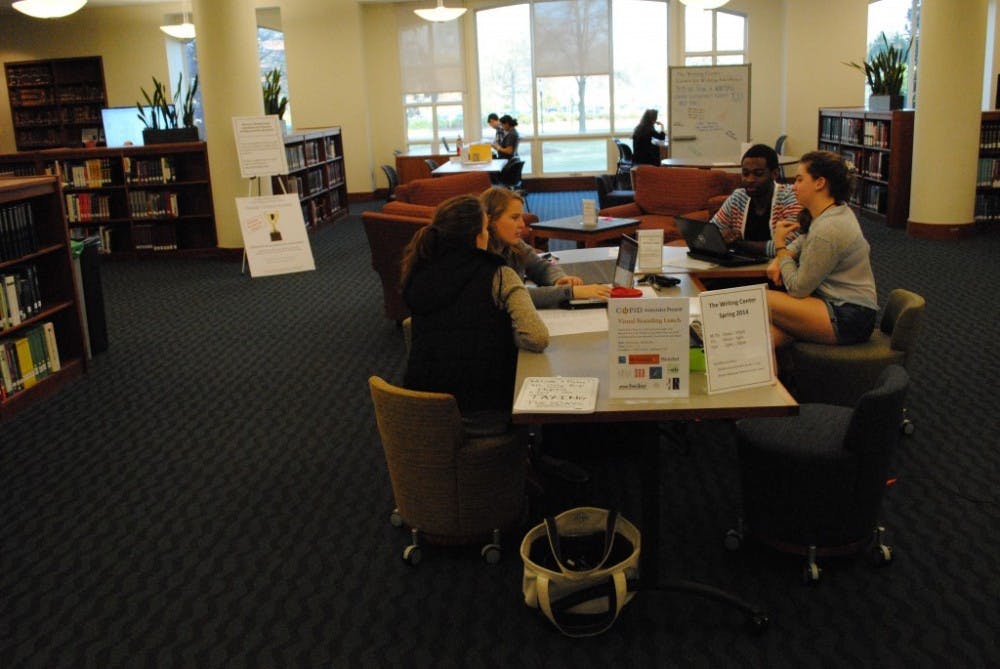Elon University’s Writing Center boasted a record number of appointments last fall as the Writing Excellence Initiative moved into year two of its five-year plan.
The Writing Center, now located in the back of the first floor of Belk Library, was founded as a part of the Writing Excellence Initiative. Last fall, the center moved into a permanent location, furnished with moveable tables, large computer monitors, bar stools and white boards.
The renovations to the Writing Center have paid off. It held 1,870 consultations last semester, up from an estimated 900 in spring 2013.
Paula Rosinski, director of the Writing Center, said the flexible layout is supposed to encourage students, faculty and staff to make the space their own.
“It makes me so happy when I go into the Writing Center in the morning and see the tables and chairs arranged in new positions and the white boards full of diagrams and words and drawings, because that means that lots of writing and thinking and collaborating happened in the space the previous day and night, and that is exactly what we hoped would happen,” Rosinski said.
A second wave of construction this summer will add presentation rooms, office space and multimedia tools.
Senior Rachel Lewis, a Writing Center consultant and scheduling expert, said she hopes the second wave of construction will encourage students to come to the center for help with more than just essays.
“People think of the Writing Center as a place where you can bring a Word document, but we do a lot more. We can help people with speeches, presentations, design issues and PowerPoints,” Lewis said. “The renovations this summer will allow us to better serve students’ multimedia needs.”
The Center for Writing Excellence oversees both the Writing Center and the Writing Across the University program. The Writing Center in Belk Library will expand to house the offices for the Center for Writing Excellence, allowing campus writing programs to collaborate on projects like the Student’s Choice writing contest held this past February.
The Center also plans to continue encouraging freshmen to take advantage of the center’s resources. 1,000 of last semester’s consultations were with freshmen, compared to only 317 consultations with upperclassmen.
“I think students are more aware of the Writing Center because admissions and first-year professors are promoting it as a great resource on campus,” Lewis said.
Many “Global Experience” professors require their students to have their papers reviewed by the Writing Center. Rosinski said faculty play a big role in educating students about the resources the Writing Center has to offer.
“I’ve found that one of the best ways to educate students about the Writing Center and what consultants do is by having faculty talk to them about it in the context of their own class writing projects,” Rosinski said. “Faculty are the ones who have the opportunity to talk with students about what is considered effective writing in their own disciplines, and out of those discussions faculty can talk with students about how it’s valuable to get feedback on their writing.”
However, some students feel professors coddle them by requiring them to get help from the center. Freshman Bria Samuels was required to go to the Writing Center for a political science course, but felt the people who helped her were not trained on how to write a political science research paper.
“I don’t think professors should mandate their students go to the Writing Center,” Samuels said. “If a student is comfortable with their own paper, that is fine, but they should only have to seek out help when they want to.”
While getting help from the center is a great way for students to improve their writing skills, Lewis said professors need to collaborate with the center as well. She said the biggest problem students face when beginning a paper is understanding the expectations the professor has for the assignment.
“Many times I’ll start my session by going through the rubric or instructions for a paper and trying to figure out what the professor wants,” Lewis said. “It would be beneficial to develop ways we could communicate with professors about assignments, especially when the professors require their students to visit the Writing Center.”
Freshman Tyler Patchen said professors are often unclear on assignments, leaving the consultant and the student to guess at the professor’s expectations.
“I think if professors gave details on certain papers to the Writing Center it would cut down on a bit of confusion and allow the people working in the center to focus more on helping the student,” Patchen said.
One proposal to fix the disconnect between professors and Writing Center consultants is a “Fellows” program that could debut as soon as next fall. A Writing Center Fellow would take the prerequisite class, English 319, but also receive additional training in a particular discipline such as political science papers, scientific lab reports or media writing.
The fellow would be matched with a faculty member from the corresponding department who would work with him or her to develop assignments, hold writing workshops for particular classes and meet with students to discuss writing strategies.
“Ideally, both the consultant and the faculty member would learn from each other and thereby enhance the writing instruction and learning for all students in a particular disciplinary class,” Rosinski said.


